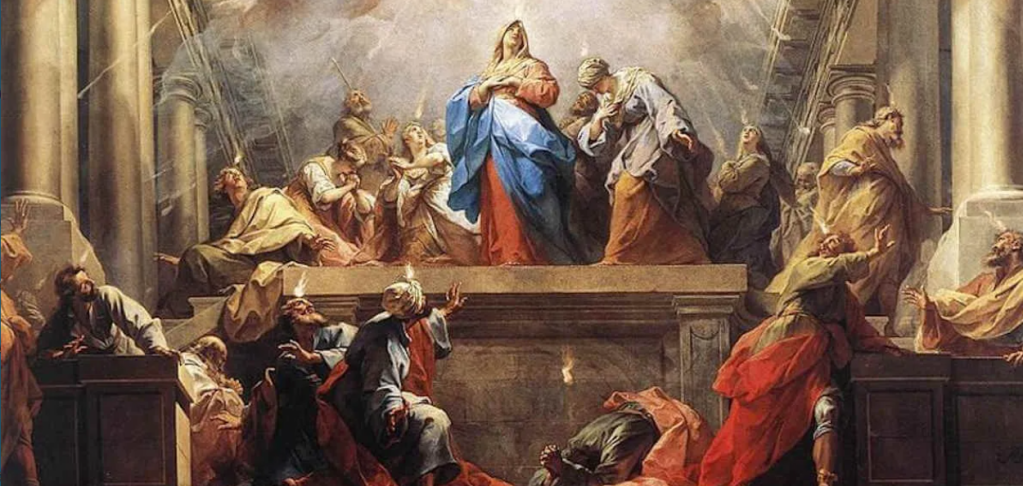The Birth Day of the Church! Hallelujah!

PENTECOSTAL PRAYER: Let us pray [that the flame of the Spirit will descend upon us] Father in heaven, fifty days have celebrated the fullness of the mystery of your revealed love. See your people gathered in prayer, open to receive the Spirit’s flame. May it come to rest in our hearts and disperse the divisions of word and tongue. With one voice and one song may we praise your name in joy and thanksgiving. Grant this through Christ our Lord. Amen
And suddenly there came a sound from heaven, as of a mighty wind coming, and it filled the whole house where they were sitting. And there appeared to them parted tongues as it were of fire, and it sat upon every one of them: And they were all filled with the Holy Ghost, and they began to speak with divers tongues, according as the Holy Ghost gave them to speak.
The Church is born! Hallelujah!
Acts 2:2-4
Come, Holy Spirit. Send out your light!
Veni Sancte Spiritus, et emitte caelitus lucis tuae radium! God’s miracles always have a purpose. The languages they were given in that upper room by means of the Holy Spirit as tongues of fire over their head were meant to enable these to speak to every foreign tongue dwelling in the city as a massive witness to begin the Great Commission: The Preaching of the Good News of Christ Jesus!
Therefore go and make disciples of all nations, baptizing them in the name of the Father and of the Son and of the Holy Spirit, and teaching them to obey everything I have commanded you. And surely I am with you always, to the very end of the age.
Matthew 28:19-20
And this gospel of the kingdom will be preached in the whole world as a testimony to all nations, and then the end will come.
Matthew 24:14
Chesterton on Pentecost
Those who maintain that Christianity was not a Church but a moral movement of idealists have been forced to push the period of its perversion or disappearance further and further back. A bishop of Rome writes claiming authority in the very lifetime of St. John the Evangelist; and it is described as the first papal aggression. A friend of the Apostles writes of them as men he knew and says they taught him the doctrine of the Sacrament, and Mr. Wells can only murmur that the reaction towards barbaric blood-rites may have happened rather earlier than might be expected. The date of the Fourth Gospel, which at one time was steadily growing later and later, is now steadily growing earlier and earlier; until critics are staggered at the dawning and dreadful possibility that it might be something like what it professes to be. The last limit of an early date for the extinction of true Christianity has probably been found by the latest German professor whose authority is invoked by Dean Inge. This learned scholar says that Pentecost was the occasion for the first founding of an ecclesiastical, dogmatic, and despotic Church utterly alien to the simple ideals of Jesus of Nazareth. This may be called, in a popular as well as a learned sense, the limit. What do professors of this kind imagine that men are made of? Suppose it were a matter of any merely human movement, let us say that of the conscientious objectors. Some say the early Christians were Pacifists; I do not believe it for a moment; but I am quite ready to accept the parallel for the sake of the argument. Tolstoy or some great preacher of peace among peasants has been shot as a mutineer for defying conscription; and a little while afterwards his few followers meet together in an upper room in remembrance of him. They never had any reason for coming together except that common memory; they are men of many kinds with nothing to bind them, except that the greatest event in all their lives was this tragedy of the teacher of universal peace. They are always repeating his words, revolving his problems, trying to imitate his character. The Pacifists meet at their Pentecost and are possessed of a sudden ecstasy of enthusiasm and wild rush of the whirlwind of inspiration, in the course of which they proceed to establish universal Conscription, to increase the Navy Estimates, to insist on everybody going about armed to the teeth and on all the frontiers bristling with artillery; the proceedings concluded with the singing of ‘Boys of the Bulldog Breed’ and ‘Don’t let them scrap the British Navy.’ That is something like a fair parallel to the theory of these critics; that the transition from their idea of Jesus to their idea of Catholicism could have been made in the little upper room at Pentecost. Surely anybody’s commonsense would tell him that enthusiasts who only met through their common enthusiasm for a leader whom they loved, would not instantly rush away to establish everything that he hated. No, if the ‘ecclesiastical and dogmatic system’ is as old as Pentecost it is as old as Christmas. If we trace it back to such very early Christians we must trace it back to Christ.
-GK Chesterton, The Everlasting Man, 1925

